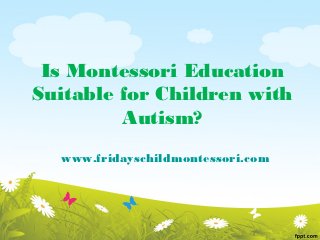
Is montessori education suitable for children with autism
- 1. Is Montessori Education Suitable for Children with Autism? www.fridayschildmontessori.com
- 2. The big question for those reading this is whether Montessori education is suitable for children with autism.
- 3. I can just about hear Maria Montessori shouting “Of course it is!” While children with autism will need a bit of extra support no matter where they go for their early childhood education, the Montessori method is particularly suitable.
- 4. In fact, many of the children who Maria Montessori originally worked with as she developed her teaching methods could very well have been autistic, as she first worked with children with severe learning difficulties.
- 5. There are a number of features of Montessori education that make it particularly suitable for a child with autism (or for any child, as Maria Montessori proved).
- 6. Montessori education allows children to work and develop at their own pace rather than expecting them to fit into a set developmental timetable.
- 7. Children in a Montessori classroom can work on their own if they wish but they will still interact to some degree with others, although autistic children may need a bit of help with this.
- 8. The use of sensory materials and hands-on activities are also very suitable for children with autism, as they are very sensitive to non-language sensory stimuli.
- 9. The order of the classroom, with everything having a “right” place also helps maintain the regularity and predictability that children with autism need to feel secure and safe.
- 10. It has to be acknowledged that if your child has autism, he or she will need extra help and support compared to the other children in a Montessori classroom.
- 11. However, Montessori learning and teaching blend extremely well with the methods used by behavioural specialists.
- 12. On the home front, one thing that you can do to help a child with autism learn to interact with others is to get a pet.
- 13. Pet therapy is often used to help these children learn how to interact with others, as playing with animals doesn’t demand the same level of language and eye contact as interacting with humans does.
- 14. Many people with autism end up working with animals later in life, including farm work, pet grooming and veterinary assistants.
- 15. And what else can children with autism do when they grow up?
- 16. There are plenty of jobs where their detachment, obsessive tendencies and insistence on strict routine can be assets, although they will need some help overcoming the hurdle of the job interview.
- 17. Work in a factory on an assembly line is a very common career choice for people with autism, but other people have done well as computer programmers and technicians,
- 18. as journalists (reporting the bare facts in a detached and unbiased manner comes naturally for those with autism) and as laboratory assistants – and even leading research scientists.
- 19. This is brought to you by Fridays Child Montessori